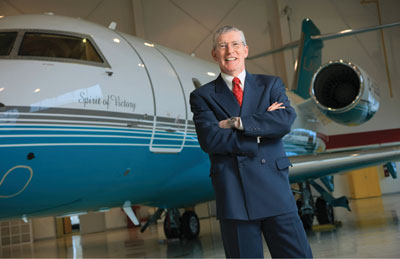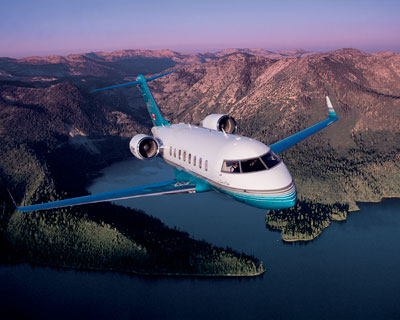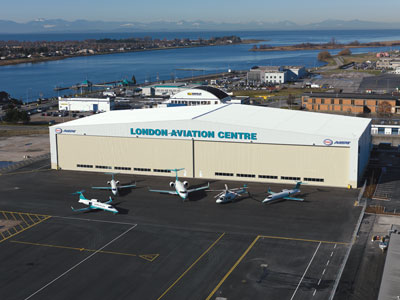
Features
Operations
CAPITALIZING ON EVERY OPPORTUNITY
Capitalizing on every opportunity and having the foresight to create your own is how many successful Canadian firms stay profitable in tough times.
January 4, 2013 By Paul dixon
Capitalizing on every opportunity and having the foresight to create your own is how many successful Canadian firms stay profitable in tough times. This is precisely the path the owners of London Air Services have taken over the past several years.
 |
|
| An accountant first and foremost, London Drugs/London Air Services’ CEO Wynne Powell understands the value corporate aircraft have brought to his universe. Photo: London Air Services |
London Air Services was initially created to be a time machine within B.C.’s H.Y. Louie Company, a $4-billion empire that includes the IGA food chain and London Drugs. In an interview with Wings at London’s home base at Vancouver International Airport, Wynne Powell, CEO of London Drugs and London Air, explained how he became charged with the responsibility of building that time machine.
Initially, deterred by what he saw as the high cost of ownership, Powell chartered aircraft as required. However, this approach quickly proved unsatisfactory. “We found that the planes weren’t to the quality that we were necessarily comfortable with,” Powell recalled. “We were always safety conscious, whether or not they had safety problems you couldn’t say, but they were older aircraft which always raises the safety concern over new aircraft. Also, you couldn’t get them on short notice.”
Powell’s solution wasn’t simply to buy a corporate aircraft, but to turn it into a business by chartering the company’s aircraft out when it was available. Familiar with the Lear 35 and Lear 55, Powell settled on the then-new Lear 45 as the ideal aircraft, but there was one small problem – a five-year waiting list. However, fortune smiled three months later, when a company that had ordered five Lears decided they only needed four.
Powell flew out that day, and as he tells it, “cut the deal and bought it. Then, we had to Canadianize it and bring it up to commercial standards because we wanted to run 604 and 605s – 604 privately and 605 charters. So, for the first few months we ran it as a 604 and once we got all the Transport Canada paperwork in order, we became a 605 operator.”
That was in early 1999 and it didn’t take long for the firm to realize that one plane was not enough. As Powell recalls, “it soon became abundantly clear that our business was growing and one plane was not enough, so we bought a second. Then it became clear to us that we needed equipment that went beyond the range of a Lear 45, so that led to the acquisition of a Challenger 604, which put London into the international market.” Within a couple of years, London Air Services had grown to its current fleet of five Lear 45s and three Challenger 604/605s.
An accountant first and foremost, Powell understood the value that using corporate aircraft brought to his universe: time was money and in many cases, time was much more than just money. “There’s always sticker shock when you’re chartering planes,” Powell says. “Warren Buffet probably had the biggest sticker shock and he talked ill of the charter business until he realized how much money you can make by using your time more effectively. Now, he’s the world’s largest owner of aircraft with NetJets and he’s a tough, tough taskmaster on financials. I think he’s a great outside validator on the financial wisdom of using these aircraft.”
When selling service to corporate clients, Powell is very big on the “time is money” mantra. “At the very beginning when we started, Air Canada was still at their very, very high rates for last-minute bookings,” he says. “I was able to show CFOs that if you were taking six people to Toronto and could avoid a hotel booking, it was virtually a break-even with going with Air Canada, at that time.
That got the CFOs over the initial sticker shock, because they were still in sticker shock with the airline prices. About eight out of 10 companies that originally booked with us are still with us. So, the CFOs moved from being concerned about the sticker price to realizing it’s not what you spend, it’s what you make as a result of the way you handle your business.”
The high-end set
In 2001, H.Y. Louie acquired the Sonora Resort, a move that would drive London Air Services into an elite service class. A fishing lodge located on an island in British Columbia’s Inside Passage, Sonora Resort had existed for years as one of the scores of fishing lodges that dot the coast of British Columbia, where men caught big salmon and smoked bigger cigars. Rebuilt, expanded and rebranded, Sonora Resort today is an 83-room complex that wouldn’t look out of place beside the chateaux and estates that line the shores of Italy’s Lake Como or Switzerland’s Lake Lucerne. The target audience has broadened to include families and couples along with corporate groups from around the world by offering a wide range of experiences, including eco-tour excursions, ocean kayaking, grizzly bear watching, aboriginal journeys, whitewater rafting, glacial helicopter tours, lots of fishing and even a full-service spa.
 |
|
| London Air Services thrives on mastering the details that define a five-star resort. Says CEO Wynne Powell: “It’s all about the details.” Photo: London Air Services |
Achieving Relais & Chateaux certification for Sonora Lodge in 2009 set the standard of service for London Air Services. It took five years for Sonora to earn the certification as one of only 14 properties (resorts, hotels and restaurants) in Canada to have that distinction. Powell takes obvious pride in saying, “you cannot buy Relais & Chateaux certification, it’s impossible to buy. It took us five years to earn it and our standards were already high, but their standards are incredible. They run secret reports on you all the time your standards are held and the chef standards are among the top in the world. It’s the platinum standard.”
The achievement has not gone unnoticed as evidenced by glowing testimonials from the world’s media, including Forbes, the Globe and Mail, Huffington Post, National Geographic Traveler and the Michelin Guide to name but a few. TripAdvisor, the world’s largest on-line travel advisory site, has ranked Sonora as the top Canadian destination resort.
London Air Services thrives on mastering the details that define a five-star resort. “It’s the little details,” Powell says. “We know what newspapers our clients like, we know what they like to eat. Our sister company, IGA, offers a food service. When we leave out of YVR, the food is always first class because it comes out of IGA and the specifications are very appropriate. You know how when you get food at the airports around the world there’s an element of risk? Our customers aren’t at risk when they leave YVR. On top of that, how many airlines have a Relais & Chateaux chef on staff? When one of the chefs is needed for a very special flight, we put them right on board. Not too many airlines can do that.”
As the commercial airline business changed over the past decade and seat prices started to come down, the direct dollar for dollar comparison was no longer valid for the charter business. It’s possible to fly cheaper by booking well in advance with commercial airlines, but there is still much more to consider in the overall equation. Powell explains: “If you buy a couple of weeks beforehand, it’s always going to be cheaper to go the commercial airline, but you’re going to be a minimum two hours at the airport, there’s parking, driving in, etc. and you’re also going to be waiting for luggage and all that when you get there. All those times get stripped away. You start looking at the effectiveness and efficiency again and you can’t match it using commercial aircraft.”
As the London Drugs empire has expanded throughout British Columbia and Alberta, use of the corporate aircraft has given Powell and his management team the opportunity to practise what they preach. Powell says his corporate aircraft are invaluable in helping his teams stay productive.
“We leave YVR around 7:30 a.m., arrive in Prince George at 8:30 a.m., the store opens at 9 a.m.,” he says. “I’m in the store looking around, then at 10:30 a.m. to 11 a.m. B.C. time, I’m in Grande Prairie. At 2 p.m., I’m in Lethbridge. At 4 p.m. I’m in Red Deer and at 6 p.m., I’m in Calgary. I’m back home at 10 p.m. [Before we had the corporate jet], I used to do this trip with Air Canada. It took a week and there was a lot of downtime. Now, we take the whole senior management team with us. The plane is always full and when we leave each location, we have our privacy so we are able to have our management meetings. The efficiency and effectiveness, speaking as an accountant, is absolutely amazing.”
Maintaining just the right corporate culture at London Air Services is paramount, and Powell is very careful when asked about his staff and what it takes to build the right team. “We’re very careful when we hire because we want to get good people,” he says. “We give them full-time work, they get good benefits and we try to build a strong team spirit. While we’re a large company, we’re privately held – we’re a family company and we try to have those family values still show within the environment. Being privately held you can always do what you believe is right to do and it makes a world of difference. For the airline business, we’ve had a relatively low turnover. A lot of the pilots we hired 10 years ago are still with us and that’s unusual. We are very fortunate, because we buy the newest and best equipment so we attract pilots who want to fly the newest and the best. They love the equipment and they love the safety standards.”
To wit, all of London Air Services’ Lear 45s are three years or younger. “And we’ve just done a deal with Bombardier where we’re changing them all to Lear 75s when the 75 comes out,” Powell says. “That will happen at the end of 2013 if Bombardier is on schedule. We’re very excited about that aircraft. It brings the Global type cockpit the vision talk cockpit to the Lear and the Garmin stuff looks very exciting. The Lear 75 offers improved performance and greater fuel efficiency over the current Lear 45s, while the Global 7000, slated for delivery in 2017, with its range of 7,400 nautical miles and larger payload will allow LAS to fly routes such as Vancouver-Beijing non-stop.”
Establishing top safety standards
Leading by example is an important element of establishing just the right corporate culture, and Powell takes careful note of this principle every day. “Safety starts at the top and I can tell you that the ‘tone at the top’ from myself is extremely safety conscious.
 |
|
| On the apron at London Air Services’ 60,000-square-foot hangar at YVR – three Lear 45s, one Challenger CL-600 and an AW139. Photo: London Air Services |
We started our Safety Management System before it was required and there are no shortcuts on safety or repairs. Everything is done to factory specifications. We do everything the factory way, the best way. The mechanics understand there’s no cutting of corners, we always want it done to the very best of specifications. We want the people flying our aircraft to know that everything is done to the highest standards.”
The company’s commitment to detail extends to every facet of the operation. London Air is a minority owner of Avitat, the ESSO FBO at YVR, which is London Air Services’ passenger hub. “We bought in as part owner because we wanted to be sure that that business provided the standards that we needed and it worked out very well for us and our partner, Derrick Watts, does a great job for us,” Powell says. “Behind Avitat is the company’s new 60,000-square-foot hangar that serves as London’s headquarters.
“We’ve been blessed with success and the customer loyalty has been fantastic,” says Powell. “You can lose customer loyalty in a second if you’re not careful. You have to be priced correctly, you have to have the correct staff, the right equipment.”
To sum up just how successful the operation has become, Powell smiles and says, “the common comment I get from customers if they ever leave us to try another airline, is straightforward – it wasn’t London Air, so, we’re back.” For London Air Services, there couldn’t be a better compliment.